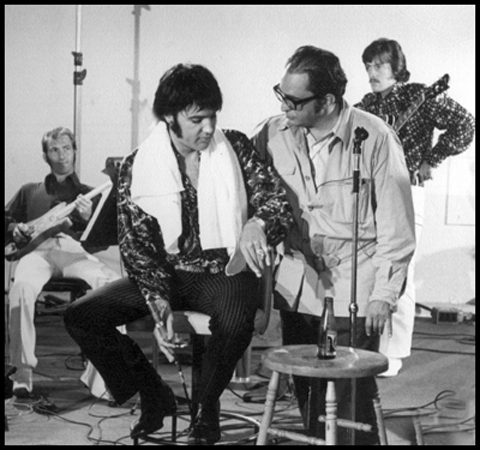
Denis giving direction to Elvis Presley in his production of Elvis, That’s the Way it Is , (MGM, 97 min., 1970)
The Academy Awards are coming up. I can never watch them without wondering about my dear late friend Denis Sanders. Denis walked up there twice to accept an award for his work, once for “short fiction film” ( A Time Out of War ) in 1954, and second in 1968, for “short documentary” ( Czechoslovakia 1968 ). He had a bunch of other awards, seventy in all, but it was those two Oscars on his mantle that stood out. I used to grab one and make impromptu acceptance speeches for “best screenplay,” saying stupid things like how grateful I was to the Academy for “this award for my screenplay adaptation of the classic children’s toilet-training story, ‘Goodbye Mr. Turd’.”
Denis didn’t rest on his laurels. He would often phone me to say, as he put it, “I had this movie last night . . .” and would start describing a scene, because, as he insisted, he didn’t have dreams, he dreamed movies. I believed him. I believed that he was special enough that while the rest of us went to sleep, Denis went the movies. There was every reason to believe him: movies were not only his profession, they were his sustenance, his recreation, his passion, his reason for being. The cinematic form so suffused his life that it was sometimes difficult to tell where his “scenes” left off and reality began. He was a director who saw life best through his art, and I could never escape the feeling that those of us who were his friends and co-workers were all players in Denis’ movie. And we willingly played our parts because we took delight in having him weave our lines into his “scenes”.
I first met him in 1980, when he was about to begin his teaching career after twenty-five years of distinction in Hollywood working with the likes of Coppola, Redford, Elvis Presley, John Ford and numerous other household “names”. He had already won virtually every major film award there is, bracketed by two Oscars, but when he first arrived at my office he didn’t look all that “distinguished”; he was short, walked with a shuffle, had a portly paunch, and looked like he slept in his clothes. Just how he got north and south with his feet splayed east and west was a puzzle to me. He had a crumpled pack of cigarettes in one hand and a lighted one dropping ashes from the other.
“You look like somebody,” more than one innocent student would say on first meeting him. He was “somebody” enough in his own right, but Denis knew who they meant.
“Yeah, yeah,” he would reply, nazalizing his voice, putting on his tough-guy sneer. If they didn’t get the clues he’d just let them hang there.
He reminded me of Edward G. Robinson, too. Where his art was concerned he employed an uncompromising toughness. Students would soon learn that idolatry or obsequy were no substitute for hard work and talent. One would err to interpret his good humor, easy rapport, and earnest concern as any relaxation of the excellence he demanded for his art. Those students who understood, the few I dubbed “Sanderistas,” could see that he demanded of them no less that he would of himself.
I remember the first class we taught together in our course “The City in the American Cinema”. When it came Denis’ turn to give his part of the intro lecture he ambled up to the podium and there he stood, not saying a word. The class hushed. A rhetorical pause, I thought, he just wants their full attention. But he just stood there, looking a little nervous and agitated now, like he might have forgotten his own name. The students started to fidget and glance at one another, like watching one of their own aphasic with terror in a speech class.
“Good God!” I murmured to myself, “he can’t be freezing up!” Still he said nothing, rocking slightly side to side, as if he might pass out. The students now looked like they were witnessing a hanging. I don’t remember how much time went by, but it felt like eternity squared.
Just as I was about to suggest that we might take a break Denis cleared his throat, refocusing their attention. “You have just been ‘directed’,” he intoned with just a hint of a smile. He went on to deliver a delightful lecture on how movies manipulate time, illustrating it with his recollections of different scenes from classic films. He never needed artifice to get their attention after that. Or mine, for that matter.
Denis’ perspective of his own art form was formed in the golden days of American cinema. He felt himself a displaced person from its contemporary rule by accountants, its faddishness, its elevations of gimmickry, gratuitous violence and visual thrills over, as he put it, “characters you can relate to and care about and stories that teach you what life is about”. One need only see his most highly acclaimed films, like the Awards winners, or War Hunt , to appreciate his allegiance to that principle. It made him a superb director as well as a fine teacher. But as much as he enjoyed teaching his heart was always behind the camera, not the podium. He was always thinking about the next film because he knew that was the medium in which he did his best teaching.
Sometimes when the phone rings in the morning I think for an instant that it’s Denis with another of his movie dreams. I still have to remind myself that he’s off shooting on an exotic location . . . somewhere.
___________________________________
©2006, James A. Clapp (UrbisMedia Ltd. Pub. 1.28.2006)
Aired KPBS-FM, Public Radio, May 19, 1988. Denis Sanders left the set in December of 1987.
